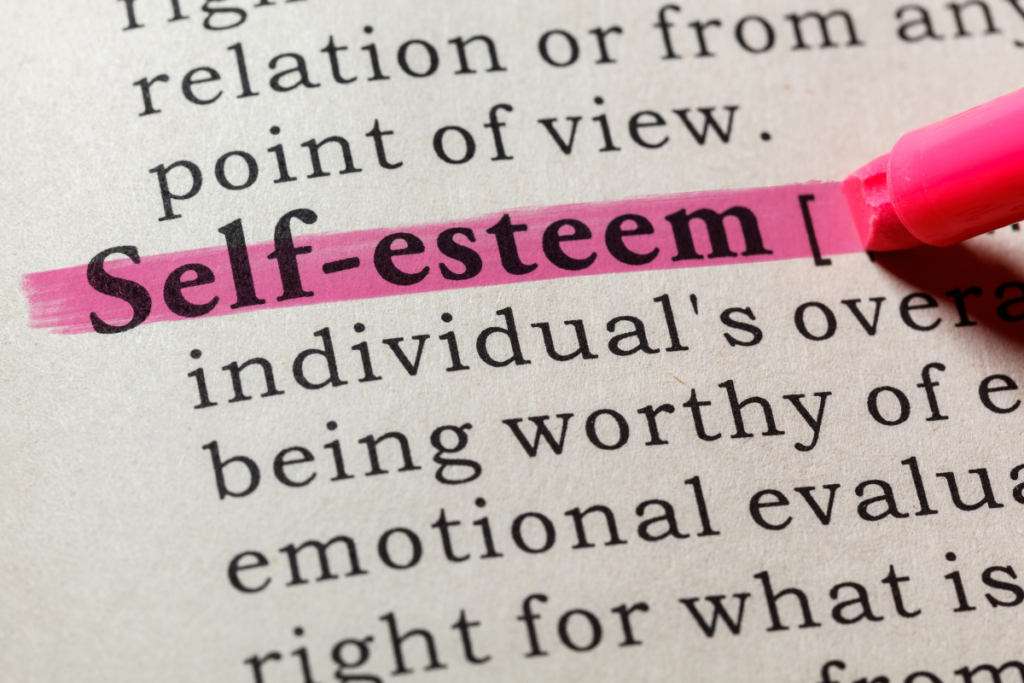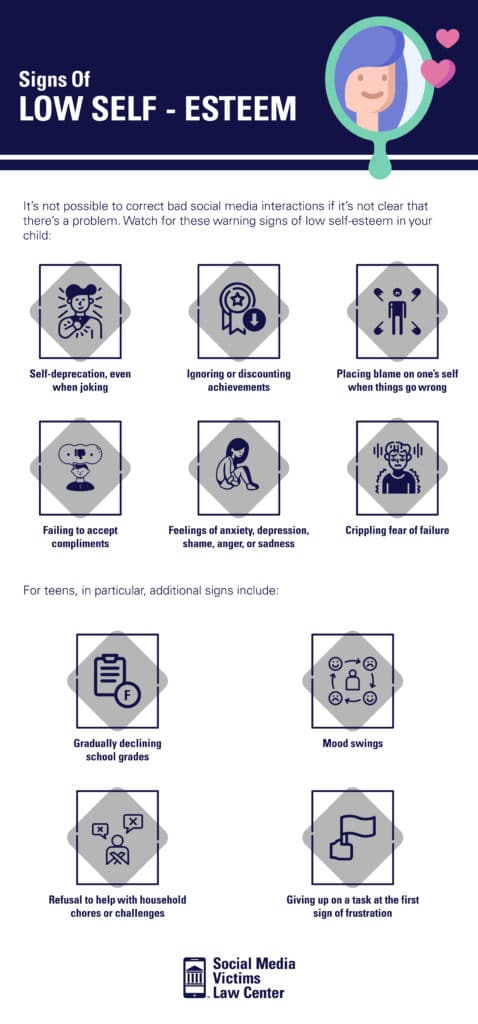Social Media’s Effects on Self-Esteem
Social media can affect the self-esteem of teens and young adults. It often leads to social comparison, seeking validation through likes and comments, and exposure to cyberbullying. This complex interplay impacts their self-worth and confidence, contributing to feelings of inadequacy, depression, anxiety, and loneliness, which affect their overall well-being.


- Content last updated on:
- March 10, 2025
Written and edited by our team of expert legal content writers and reviewed and approved by

- Content last updated on:
- March 10, 2025
As social media continues to grow in popularity, the consequences of heavy online use have become increasingly clear. While social media can have many positive effects, researchers are aware its potential negative effects can have long-term impacts on teens’ mental health and overall well-being – especially on their self-esteem.
According to studies, social media use appears to cause a decrease in self-esteem, with the group most affected being girls between the ages of 10 and 14.
For instance, Facebook has been pinpointed as a social networking site that attracts adolescents with lower self-esteem yet worsens the problem as the teens engage in higher levels of social comparison. This can create an even lower, skewed self-image.
With every passing year, social media changes the way people interact. When used carefully, social networking sites can connect people to otherwise inaccessible opportunities, information, services, and communities. As a parent, it’s important to acknowledge that social media will be a part of your teen’s daily life. However, you must also be aware when it has an adverse influence on their self-esteem or mental health.
This age group is already more susceptible to self-esteem issues: they’re less aware of who they are, who they’re becoming, and they’re extremely sensitive to comparisons with others, including appearances, clothes, grades, clubs and other interests. They’re bombarded with messages on TV, magazines, and the internet about who they should be and things they should like if they want to be considered “cool,” accepted, popular, or even normal.
Unfortunately, such comparisons are even more rampant online. Worse, it’s difficult to get away from as studies have shown that social media can be more addictive than even alcohol or cigarettes, especially because the internet is “free,” easy to access, available 24/7, and seemingly harmless. However, numerous studies indicate that social media use is linked to increased risks of depression, anxiety, loneliness, and low self-esteem.
Many people, especially celebrities and “influencers,” use their social media profiles to project a perfect image with carefully chosen (and edited) photos and videos, many made with different filters or image-editing software. As a result, children and teens who follow those profiles may feel their own life is lacking and can begin to feel worse about themselves.
For many, comparing themself to others becomes an unavoidable compulsion, and often tends to make them feel inferior and negatively impact their self-esteem. With social media, the opportunity for social comparison is virtually infinite.
Social media can also add stress to a teen’s daily life, especially when it comes to evaluating their own social media updates. Each time they post a picture or status update, they can worry about the number of likes, shares, and comments the post will generate. This obsession is yet another opportunity for comparison and potential embarrassment about how others view them, especially if another person’s got more attention and positive feedback.
It is possible to correct bad social media interactions, but first a parent has to realize that there’s a problem. Even if your child gives off the appearance of confidence, they could have low self-esteem. If your teen speaks negatively about their life, judges themself, has negative body image, or is hypercritical of their failures, they may be suffering from low self-esteem brought on by the excessive use of social media apps. There are warning signs of low self-esteem:
- Self-deprecation, even when joking
- Ignoring or discounting achievements
- Blaming oneself when things go wrong
- Failing to accept compliments
- Feelings of anxiety, depression, shame, anger, or sadness
- Crippling fear of failure
For teens, in particular, there are additional signs:
- Gradually declining school grades
- Mood swings
- Refusal to help with household chores or challenges
- Giving up on a task at the first sign of frustration
If you notice indications of low self-esteem or social media addiction in your teen, it may be time to gently correct the way they use or view social media. Low self-esteem can have lifelong consequences if not reversed, so you’ll want to address the problem as quickly as possible.
- Set limits for their online time.
- Set boundaries for appropriate times to check social media accounts (and make sure it’s never right before bed).
- Have an honest conversation about how unrealistic social media posts can be.
- Limit distractions by changing notification settings.
- Set a good example about healthy social media use.
- Encourage hobbies and activities that aren’t online, especially activities that makes your child feel accomplished.
Implement each of these tips gradually, discussing each change with your teen so that they know why it’s happening. Guide them gently to a healthier mindset about social media — one that will encourage good self-esteem.
Unfortunately, social media companies and their platforms have not done enough to safeguard your child’s mental health and self-image online – even though it’s within their power. If your child or teen has fallen victim to the negative effects of social media use, reach out to the Social Media Victims Law Center. We work to hold social media companies legally accountable for the harm they inflict on vulnerable users. Contact us today to schedule a free consultation and learn how we can help you.
As social media continues to grow in popularity, the consequences of heavy online use have become increasingly clear. Researchers suggests its negative effects that can have long-term impacts on teens’ mental health and overall well-being.
For instance, some studies have shown a correlation between social media and online networking sites and a teen’s self-esteem. Specifically, Facebook has been pinpointed in studies as a social networking site that tends to attract adolescents with lower self-esteem, exacerbating the problem as they engage in higher levels of social comparison thereby adapting an even further skewed self-image.
As a parent, it’s important to acknowledge that social media will be a part of your teen’s social life. However, you must also be aware of when it’s having an adverse influence on your child or teen and their self-esteem or mental health. With every passing year, social media continues to change the way people interact. As those interactions change, so does the mental health of each person involved. Numerous studies continue to indicate that social media use correlates to increased risks of depression, low self-esteem, loneliness, and anxiety.
According to some studies, social media use does appear to cause a decrease in self-esteem, with the age group most affected being girls between the ages of 10 and 14.
There’s so much more for researchers to learn about the relationship between social media use and self-esteem. This page goes deeper into recent studies and what the results tell us about some of the negative impacts of social networking platforms.
Learn more about active lawsuits for social media addiction
The Negative Effects of Social Media on Self-Esteem
Social media can add stress to your daily life, especially when it comes to evaluating your own posts. Each time you post a picture or status update, you might worry about the number of likes, shares, and comments your post will generate. This obsession to be seen offers another opportunity for comparison, as you might wonder why another person’s images or content got more attention and positive feedback than yours.
If you want your teen to continue using social media but also hope to combat the negative effects it’s having on their self-esteem, have them consider the following:
- Remember that social media doesn’t paint an accurate picture of a person’s life.
- Don’t determine your self-worth based on social media.
- Take a break if you’re feeling down because of social media comparisons.
Signs of Low Self-Esteem
It’s not possible to correct bad social media interactions if it’s not clear that there’s a problem. Watch for these warning signs of low self-esteem in your child:
- Self-deprecation, even when joking
- Ignoring or discounting achievements
- Placing blame on one’s self when things go wrong
- Failing to accept compliments
- Feelings of anxiety, depression, shame, anger, or sadness
- Crippling fear of failure
For teens, in particular, additional signs include:
- Gradually declining school grades
- Mood swings
- Refusal to help with household chores or challenges
- Giving up on a task at the first sign of frustration
At its core, self-esteem is how you think about yourself. Even if your child gives off the appearance of confidence, they could have low self-esteem. If your teen speaks negatively about their life, judges themself, has negative body image, or is hypercritical of their failures, they may be suffering from low self-esteem brought on by the excessive use of social media apps.
You can help your teen try to combat these feelings by reminding them that their worth is not related to their social media interactions. Just as you wouldn’t want them to continue to pursue a relationship or friendship that makes them feel bad, encourage them to sign offline for a bit if social media is making them feel the same way.

Social Media and the Social Comparison Theory
Social comparison has always been part of human behavior. According to the social comparison theory, first proposed in 1954, people have a natural tendency to evaluate themselves in relation to others. While this can sometimes lead to positive self-reflection, it more often results in feelings of inadequacy—especially when comparing oneself to those perceived as more successful, attractive, or accomplished.
Social media has amplified this effect, providing an endless stream of carefully curated images and content that create unrealistic standards. Unlike real-life interactions, where people see both successes and struggles, social media showcases highlight reels—filtered, edited, and often staged moments designed to project perfection. This constant exposure fuels upward comparisons, making users feel as though they don’t measure up.
Young people, in particular, are highly susceptible to these pressures. Adolescents are already navigating issues of identity and self-worth, and social media intensifies their insecurities by bombarding them with unattainable ideals. Whether it’s appearance, fashion, academic achievements, or social status, the digital world creates a breeding ground for unhealthy comparisons.
Compounding the issue, studies suggest that excessive social media use can be addictive—more so than alcohol or cigarettes—due to its accessibility and endless engagement loops. With platforms available 24/7, users are continuously drawn into a cycle of comparison that can erode self-esteem and contribute to anxiety and depression.
While social comparison has always existed, social media has transformed it into a relentless, inescapable experience. Without mindful use and boundaries, it can take a serious toll on mental well-being, particularly for young users who are still developing their sense of self.
Talking to Teens About the Truth Behind Social Media Content
If you have a teenager at home, it’s important to talk to them about the harmful effects of social media. Open and honest conversations can help them recognize the dangers, especially when it comes to self-esteem, privacy, and online interactions. Keep the discussion direct, making sure they understand how social media distorts reality and promotes unhealthy comparisons.
Help your teen develop a critical mindset by encouraging them to:
- Be cautious about sharing personal information online.
- Avoid posting anything they wouldn’t want made public.
- Recognize that much of what they see online is manipulated or filtered to create an illusion of perfection.
If you notice your teen struggling with social media’s effects, approach the conversation calmly and without judgment. Creating a space where they feel safe discussing their concerns can help them make better choices about their online exposure.

Addressing Low Self-Esteem in Teens
If you notice signs of low self-esteem in your child, it’s important to address the issue early, as it can have lasting effects on their confidence and well-being. Taking proactive steps can help them develop a healthier mindset and stronger sense of self-worth.
Here are some ways to support your child’s self-esteem:
- Set limits on overall screen time to reduce exposure to harmful content.
- Create boundaries around device use, such as avoiding screens before bed.
- Discuss how media and online content often present unrealistic portrayals of life.
- Reduce digital distractions by adjusting notification settings.
- Encourage hobbies and activities that build confidence and provide a sense of accomplishment.
Introduce these changes gradually, explaining their purpose to help your child feel supported rather than restricted. Open communication and a balanced approach can make a significant difference in their self-esteem and overall well-being.
If your child or teen fell victim to the negative effects of social media use, contact Social Media Victims Law Center today to learn how we can help you.
Contact Us Today
Related Pages
Client Testimonials
Is Your Child Addicted to Social Media?
You Are Not Alone.
We have helped hundreds of families just like yours whose children and teens were affected by social media addiction.

